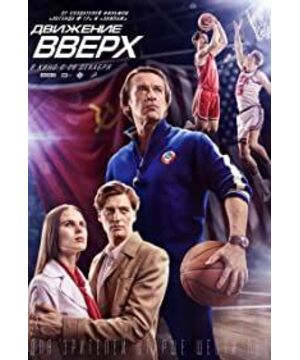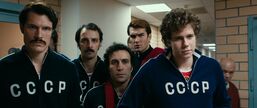Before watching "The Killing of Munich," I learned two things.
First, the film set a box-office record in Russia, becoming the highest-grossing film in history.
Second, the film is based on real events. In the 1972 Munich Olympics basketball final, the under-appreciated Soviet team defeated the US team in the last 3 seconds, creating history.
Looking at these two things together, it seems that we can find a reason for the high box office of the film. Isn't it just a collective self-exaltation of the fighting nation?
To be honest, I thought the same thing before watching it.
But after looking at it, I think this statement is only half right.
The box office miracle of "The Killing of Munich" certainly has the element of national pride, but what cannot be ignored is the success of the film itself at the production level.
I hadn't seen a commercial Russian film for a long time before "The Killing of Munich."
The few movies I watched before, whether it was "A Fool in a Dangerous Building", "No Love to Tell" or "Midsummer", are all good movies, but they are also literary films.
I have absolutely no idea how far Russia can shoot commercial films now.
It was not until I watched "The Killing of Munich" this time that I realized that the original Russian commercial films have also become so mature.
Said it is mature, reflected in several aspects.
First, typing is done well.
"The Killing of Munich" is a typical "mission-based" movie, and there is only one goal in front of the protagonist: to beat the US team. To this end, the Soviet players have to overcome all difficulties and finally complete the task.
What the film shows us is this process, it has to be ups and downs enough, but also convincing enough, and "Lore Munich" has undoubtedly achieved this.
Second, the pace of the film is good.
Commercial films are most about rhythm. The opening of the film must quickly set goals, draw out contradictions, and set up obstacles on the road to the goal. A small explosion every ten minutes, a major difficulty every half an hour...
These classic Hollywood routines, "The Killing of Munich" are all well played.
Third, commercial films also pursue a simple and direct emotional experience.
For example, action films pursue "cool", comedies pursue "laugh", and horror films pursue "scare"...
What is the pursuit of "Lore Munich"?
burn.
Yes, this is the hottest movie I've seen recently.
Its "burning" lies first in the story level, in that the protagonist has completed the impossible task.
How unlikely is it?
You know, the U.S. team at that time was a veritable armada, maintaining a complete victory record in the previous 36 years of Olympic history.
The Soviet side was a mess.
The team's meritorious coach was dismissed due to political issues, and the newly appointed coach, Garland, was a little powerless in the face of a disorganized team.
Looking at these players with different concerns, you will never imagine that in a year later, it was them who defeated the mighty US team.
But a miracle just happened.
The colorful passage of the film is to reproduce the final final. Although it is not as one-to-one restoration as "Bohemian Rhapsody", it is still shocking enough.
The director used all the audio-visual techniques to create a burning point.
Such as the gathering moment of the heroes . Friends who are familiar with Marvel understand that this moment must be indispensable. It is the moment before the battle, sometimes even more powerful than the battle itself.
Another example is the use of close-up shots to photograph the collision of muscles, murderous eyes, dripping sweat...
There is also the tried-and-true " slow motion + mute " presentation, especially the last 3 seconds of the final - the moment that decides the outcome. The director uses slow motion to deliberately lengthen the time, creating a confrontation between eternity and a moment, forming tension; and using "silence" to trigger the psychological mechanism of "emotional imitation", so that the audience also hold their breath together until the basketball enters the frame and the sound reproduces , the audience's emotions are also released.
You can call these tricks vulgar, but there's no denying that it works.
Of course, the above is just the "burning" on the surface.
This kind of "burning" comes from witnessing the birth of miracles. It allows us to experience a sense of transcendence that "breaks the limit", so the adrenaline also soars.
But what I want to say is that this kind of burning is not enough. A qualified burning tablet must also establish an emotional burning point in order to really explode.
This is precisely the biggest highlight of "The Killing of Munich".
What emotions are most likely to explode?
For a film like "The Killing of Munich", it's nothing more than nationalism and sportsmanship.
Needless to say, the detonating power of the former is very large, but the problem is that it is too local, and it will be difficult to adapt to the environment when you go abroad.
The latter should be more universal and pursue the sportsmanship of "higher, faster and stronger", which is also the meaning of many competitive movies.
But the interesting thing about "The Killing of Munich" is that it avoided these two landing points.
Instead of appealing to narrow nationalism, it didn't make Team America a masked villain, but it slapped the Soviet government to its core. In addition, it does not repeat the old stalk of sportsmanship, but sets the film's landing point in a seemingly smaller but actually bigger place, which is the simplest emotion between people.
From this point of view, "Lore Munich" is not so much a sports movie as it is an emotional movie.
If you don't believe me, what you watch the movie is about in the biggest space, it's not the game, it's not training, it's not basketball skills, it's human emotion.
So we see that the love between Sasha and his fiancee came to an abrupt end because Sasha was terminally ill. The moment they parted, someone else's wedding was going on because no one would stop playing music for their grief.
We also saw the father-son relationship between coach Garland and his son. The son was born with a disease and could not stand up. The reason why Garland was appointed in a critical situation was to take his son abroad for medical treatment.
We also saw the conflict and reconciliation between the star player Belov and the coach Galanzhin; we saw the players who wanted to escape the Soviet Union through the Olympic Games, but they returned to the game because of the broken brotherhood; The sick Sasha spent all the money to treat his son's illness...
These off-site factors have been featured in the film again and again, and have become an indelible stroke.
It shows us that the game is not just about winning and losing, and the players are not game machines. They actually have their own emotional appeals, and that emotion in turn motivates them and becomes their reason for fighting.
Therefore, the final victory is no longer just the victory of a game, but a compliment of these universal emotions, a proof of "big love works miracles".
So, do you know what the hottest moment of the film is?
It wasn't the winning last three seconds on the field, but after the victory, the players returned to the locker room, piled up envelopes with bonuses, and handed them over to the coach to treat their children.
That moment is the hottest moment.
Because it ignites the emotions that are prevalent in everyone.
We don't all have the chance to get on the field and win championships, but that doesn't prevent us from having a heart that fights for our loved ones and beats firmly in the tough life.
Finally, I want to say that I have always been a very sad person, and I have an instinctive vigilance against "burning tablets".
But occasionally, I feel that I can't be so sad all the time, and I should be a little excited. Sometimes "heart" changes with "external actions", and when you smile, your heart will be a little happier.
I recommend this movie to those who are tired of life. It is also good to watch a movie and regain a little strength to continue fighting against the world.
View more about Three Seconds reviews











